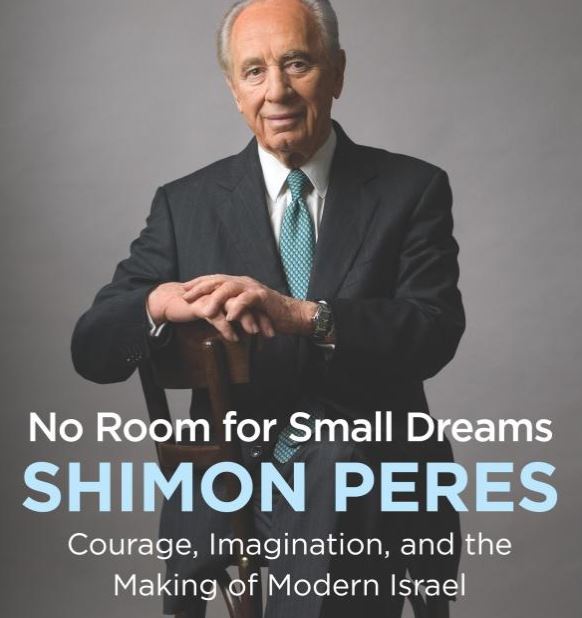I just finished reading the autobiography of the late Shimon Peres, No Room for Small Dreams. Courage, Imagination and the Making of Modern Israel.
Peres, who spent a lifetime in public service to his country, was also a beloved, inspirational elder world statesman. He was esteemed by people of all faiths for his optimism, hope, and belief that the world could not only be better but that we can make it as great as our imaginations allow us. He wrote, “Throughout my life, I have been accused by many people…of being too optimistic – of having too rosy a view of the world and the people who inhabit it. I tell them that both optimists and pessimists die in the end, but the optimist leads a hopeful and happy existence, while the pessimist spends his days cynical and downtrodden” (p.79). And let’s remember, Peres, who received a Nobel Prize for peace-making, also knew the horrors of war and death throughout his long life (he died at the age of 93, on September 28, 2016). He didn’t write these words from a detached perch of one who had lived a carefree, luxurious life.
Peres then goes on to explain just how dangerous cynicism is not just for an individual, but for a nation -any nation. “First, it’s a powerful force with the ability to trample the aspirations of an entire people. Second, it is universal, fundamentally part of human nature, a disease that is ubiquitous and global. Third, it is the single greatest threat to the next generation of leadership. In a world of so many great challenges, what could be more dangerous than discouraging ideas and ambition” (p.79)?

The Jewish festival of Hanukkah, which concludes on December 20, is a holiday that celebrates hope and optimism over cynicism and despair. We have what are likely accurate historical records of internal debates within the Jewish community of that time between those who were cynical about the possibility of overcoming the seductive Greek culture and mighty army of the Syrian Empire, and those who maintained their optimism against all odds. And the pessimists had a pretty good argument: how could a ragtag, untrained and hastily created a fighting force of Maccabees defeat one of the world’s great powers and reclaim its right to live authentically according to its way of life, making contemporary adaptations on its terms? It turns out that the optimists were right, and we’re still celebrating Hanukkah by kindling lights that inspire us to banish cynicism and replace it with light, joy, and hope. And despite its different origins, the celebration of Christmas, that often coincides with the days of Hanukkah, only reinforces the universal need for more dreamers of hope to nullify cynics who seek to corrode the human spirit.
The refrain of one of the last songs of a great poet and songwriter, Leonard Cohen, was, “You (God) want it darker, We kill the flame.” (LYRICS) Cohen was giving voice to the cynicism about the possibility to restore justice, dignity, and opportunity to the many who are still deprived of these basic rights. What’s worse is that this cynicism is often espoused by political leaders, who should be inspiring people’s imaginations with positive possibilities. If Peres, a modern-day Maccabee, had rewritten those lyrics, they would more likely be, “You want it brighter, we light the flame.”
Simply kindling a light won’t make the brightness of hope last for very long. But reflecting on the power of a flame challenges us with a choice: do we want to watch the cynics burn out our latent possibilities for greatness, or inspire us with acts of kindness and imagination to dream about just how beautiful and good the world can be? I’m going with the optimists, not because I’m naïve, but because they actually have a better track record!